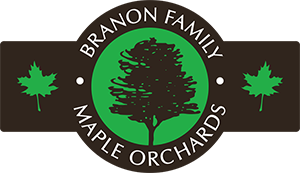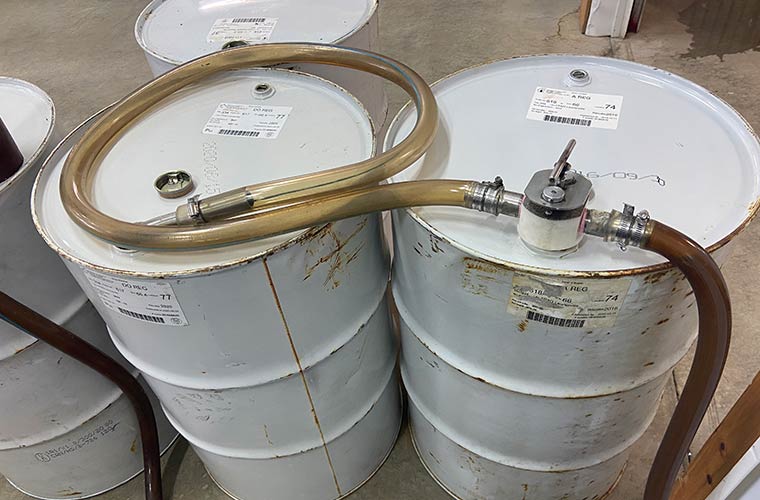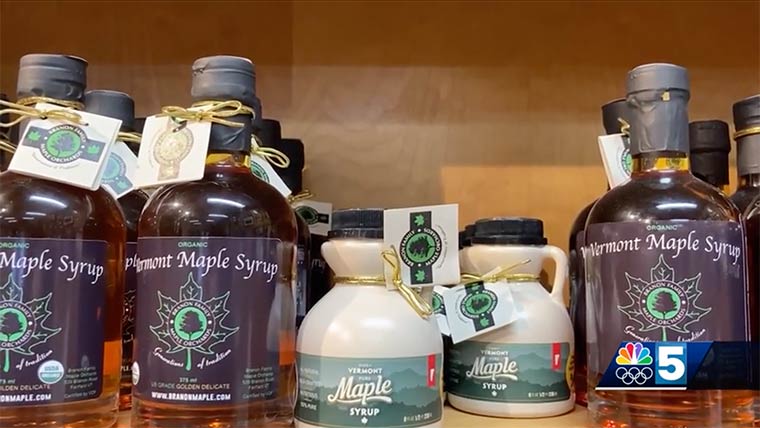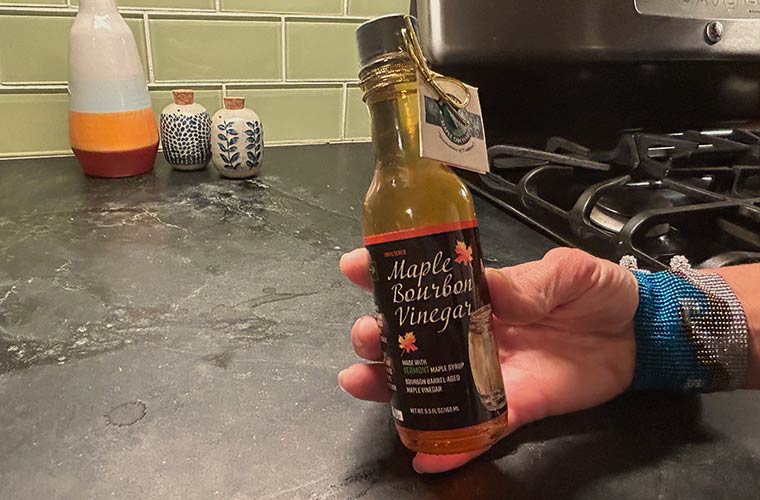A Sweet Partnership As the calendar turned to 2025 and we finished our end-of-year paperwork,…
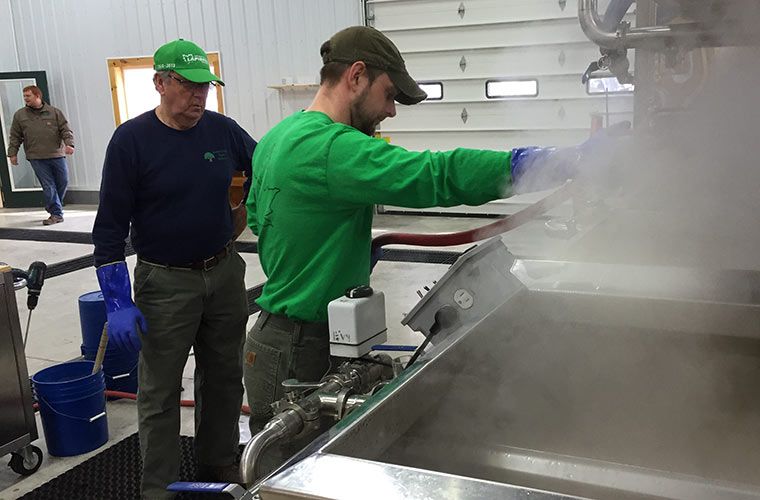
The “Heart and Soul” of Sugaring in Vermont
On a thousand acres in Fairfield stand more than 68,000 maple trees tapped for sugaring season.
FAIRFIELD – Cecile Branon took her first tour of Maple Open House Weekend — the White family of Georgia, Vermont — into the crisp, cold air Saturday morning for a look at a tap and line coming out of a soft maple near the Branon Family Maple Orchards sugarhouse in Fairfield.
Sugar warehouse, really. The Branon operation, split between Fairfield and Bakersfield, taps 68,000 trees, and that’s down from past years, before a series of storms forced the Branons to take damaged trees offline. The 2013 storm coating trees and vacuum lines with two inches of ice was particularly damaging.
“It was a disaster,” Cecile Branon said.
The Branons — Tom and Cecile and three of their four grown boys — couldn’t even get into their woods for almost two weeks, and even then it was dangerous.
“You could hear everything crashing down,” Cecile Branon said. “We had to cut our way into the woods.”
The White family — Andy and Carrie and their children, Quin, 6, and Malia, 4 — gathered around the tree near the sugarhouse as Branon explained the beginning of the sugaring process, tapping the tree.
A few feet up the double trunk of the maple, a single plastic tap penetrated the tree, attached to a 5/16-inch looping vacuum line, clogged with frozen sap. The sap isn’t flowing yet, given the unseasonably cold weather.
“Yesterday it was supposed to be 42 degrees,” Branon said. “Nothing. We didn’t get a drop. Everything was froze up.”
What the sugarbush needs, Branon said, is rain and snow combined to get moisture to the roots of the trees and onto the bark, where snow usually clings, and then warm days and cold nights to get the sap flowing.
“We could lose everything and be done in two weeks,” she said. “It’s Mother Nature.”
Top county in the top state
But Branon is not complaining. She tells the Whites, with obvious pride, that Franklin County is the top-producing county for maple syrup in the state, and that Fairfield is one of the top-producing towns. The Branons have been farmers and sugarmakers for seven generations.
Cecile Branon explains how careful her family is with their trees — tapping only 11-inch diameter trunks and up, using only one tap in even the biggest trees, using new taps every time to keep down the chance of bacteria growing, and making sure old tap holes heal up properly.
Even with all that care, Branon worries about a deadly threat over which the family has no control — the Asian long-horned beetle.
“We keep praying we don’t see the insects that will destroy our trees,” Branon said. “It would just destroy everything.”
Branon’s voice is loud and clear, with the clipped Vermont accent that is a sure sign of a native. She’s a bundle of energy and enthusiasm, so that even her foreboding explanation that a bug could torch decades of hard work seems somehow upbeat. It’s hard to believe it could ever happen.
Back inside, Branon walks the Whites through a thorough, hour-long tour of the sugaring process, from the sap running into holding tanks through 4-inch lines buried underground, to the massive, stainless steel evaporator in the expansive boiling room where the sugar content in the sap is concentrated to 66 percent. Coming out of the trees, the sap runs at 2 to 3 percent sugar content.
“You got a long ways to go,” Branon says of getting the sugar content where it needs to be.
The scale of the Branon operation is perhaps best reflected in the three 20,000-gallon storage tanks, embedded horizontally in the wall of a room with soaring ceilings and only the front few feet of the tanks showing. The tanks, towering perhaps 15 feet high, were purchased years ago from a Labatt brewery in Canada. Branon said she couldn’t afford to buy such tanks nowadays, even if she could find them.
“These are glass-lined tanks,” Branon said. “It’s very cold and very black in there. We have to crawl in on our bellies. These tanks are washed all the time. This tank was washed last night.”
Say what?
The door the Branons use to enter the tanks look like it would be a tight squeeze for 6-year-old Quin White, much less the full-grown Branon boys. And Cecile Branon carries her weight in both the sugarhouse and the sugarbush, where she joins her husband and sons for the hard work of maintaining 68,000 maple trees.
Big money, big syrup
Impressive as it is, however, Branon Family Orchards pales in comparison to a new operation in the Northeast Kingdom, Sweetree LLC, which has announced it plans to become the biggest producer of maple syrup in North America.
Backed by Wood Creek Capital Management, a private equity firm in New Haven, Connecticut, Sweetree bought 7,000 acres of forest land in Warren Gore and Averys Gore in Island Pond, and has already installed 95,000 taps, with plans for 500,000 taps.
Cecile Branon hopes for the best from this new development in Vermont’s maple syrup industry, but clearly has her doubts.
“Hopefully it will be positive,” she said. “I understand they’re looking to do more with foods and stuff and that’s good because it’s all value-added.”
But what Branon worries about is losing the family values that have always characterized the Vermont sugarbush. She and her husband, Tom, looked at the property Wood Creek bought, which was priced at $1.7 million, and passed.
“People are getting into the industry, but it’s more than just producing a product,” Branon said. “For us it’s your heart and soul, it’s your history, it’s been your life. There’s a lot more to it than, ‘Oh, I’m going to make maple syrup and make some money.’ Making money is hard because it’s a lot of work. I guess if you’ve got a lot of money you don’t really care.”
Wood Creek Capital Management certainly has a lot of money, with about $2.1 billion under management. Wood Creek is an affiliate of Babson Capital Management LLC with offices in Boston, New York and Charlotte, and more than $212 billion under management.
“What’s important as we see a lot of growth and people coming into Vermont is that they realize it’s a love to do it,” Branon said of sugarmaking. “It’s a life. It’s a livelihood.”
Coming to the end of the tour in the barrel storage room, Melia and Quin White have about reached their limit for learning about the maple syrup business. Melia circles the expansive concrete floor as Quin squats down, his sister finally coming over to pat his back.
But next is the kitchen, with all kinds of maple treats.
“We’ve got maple popcorn over there and some maple candy, which is all pure maple, and some barbecue sauce,” Branon said. “Help yourself to try everything. If you have questions, holler. We’ll be glad to help you out.”
Originally published on Burlington Free Press.
